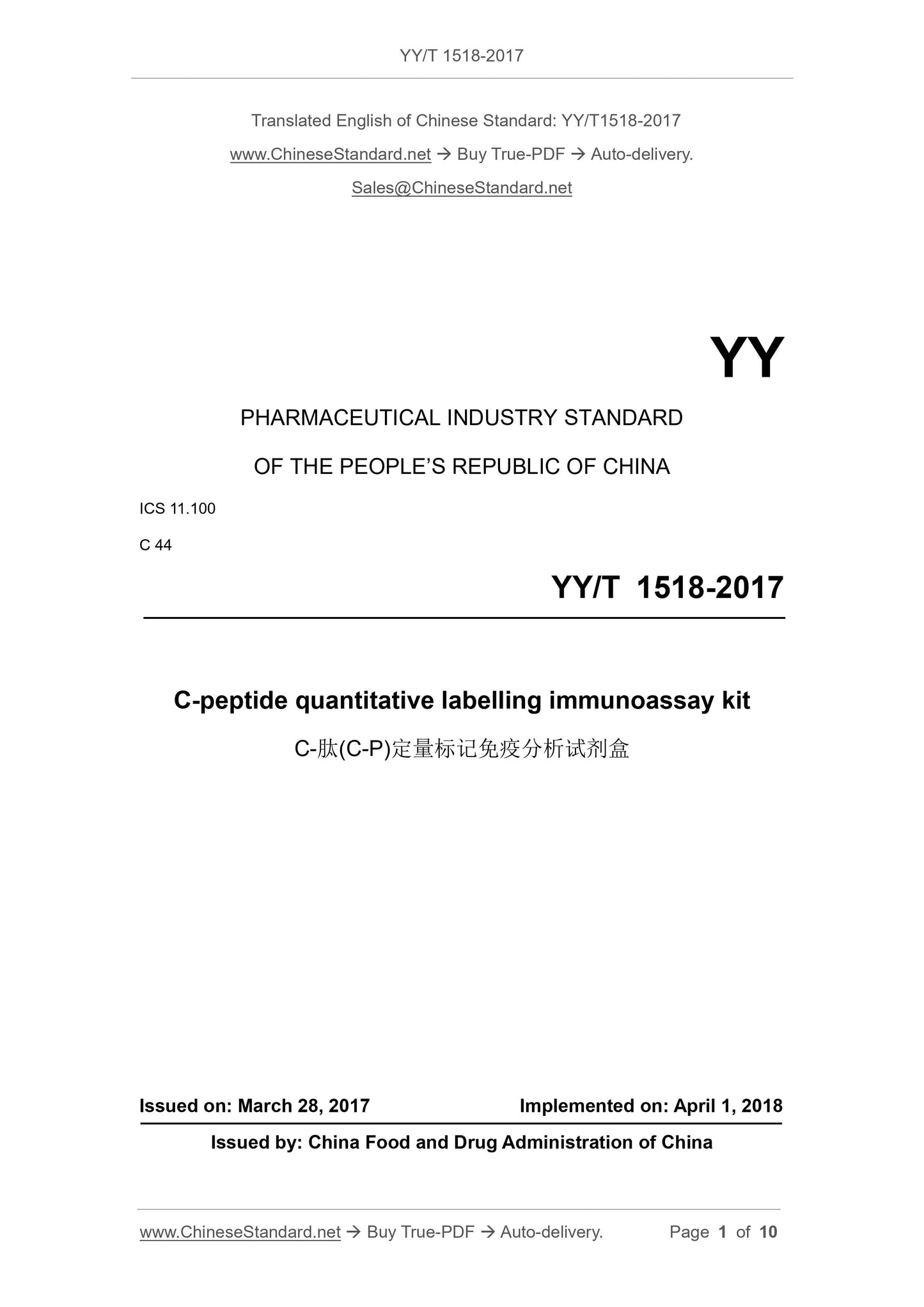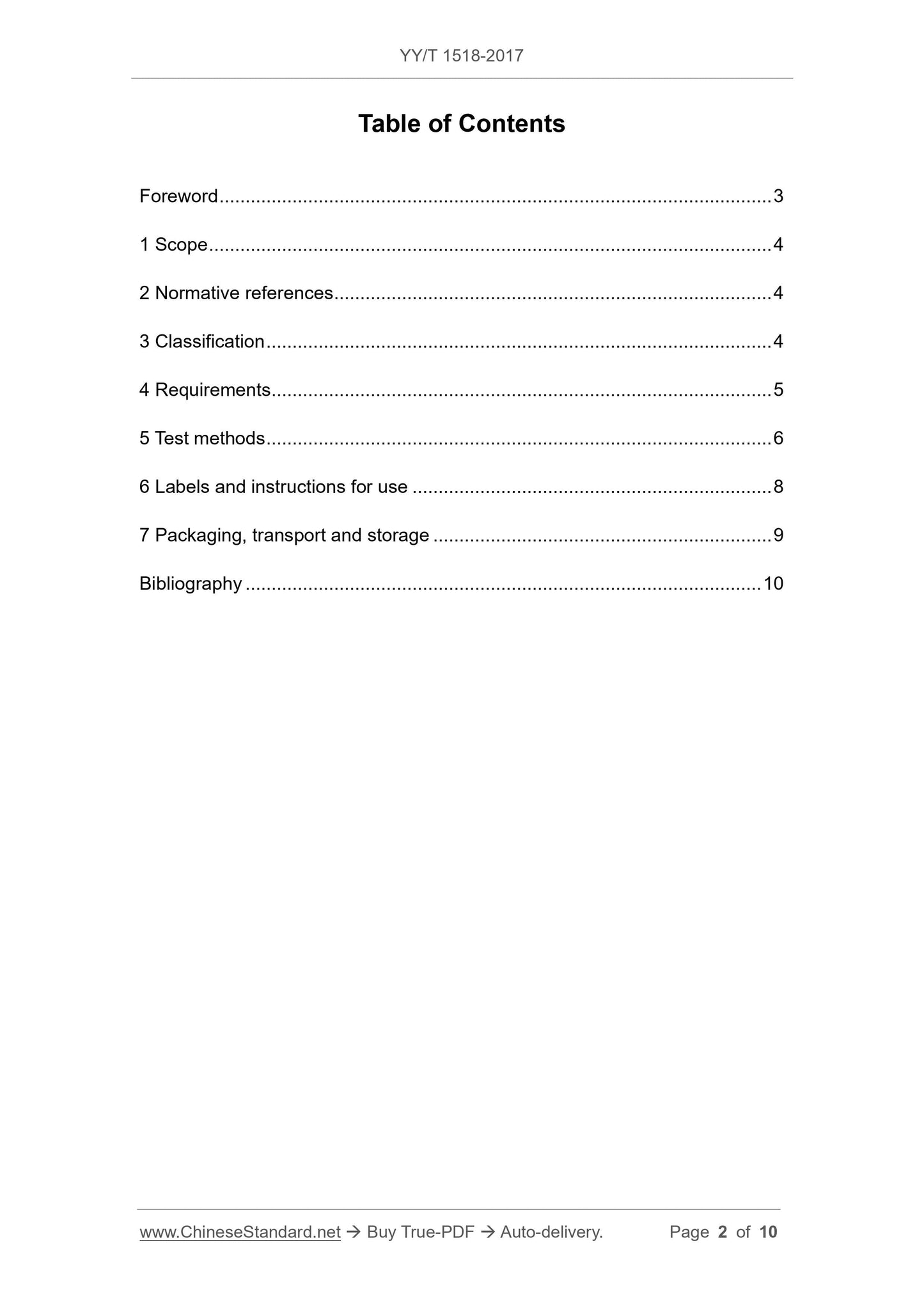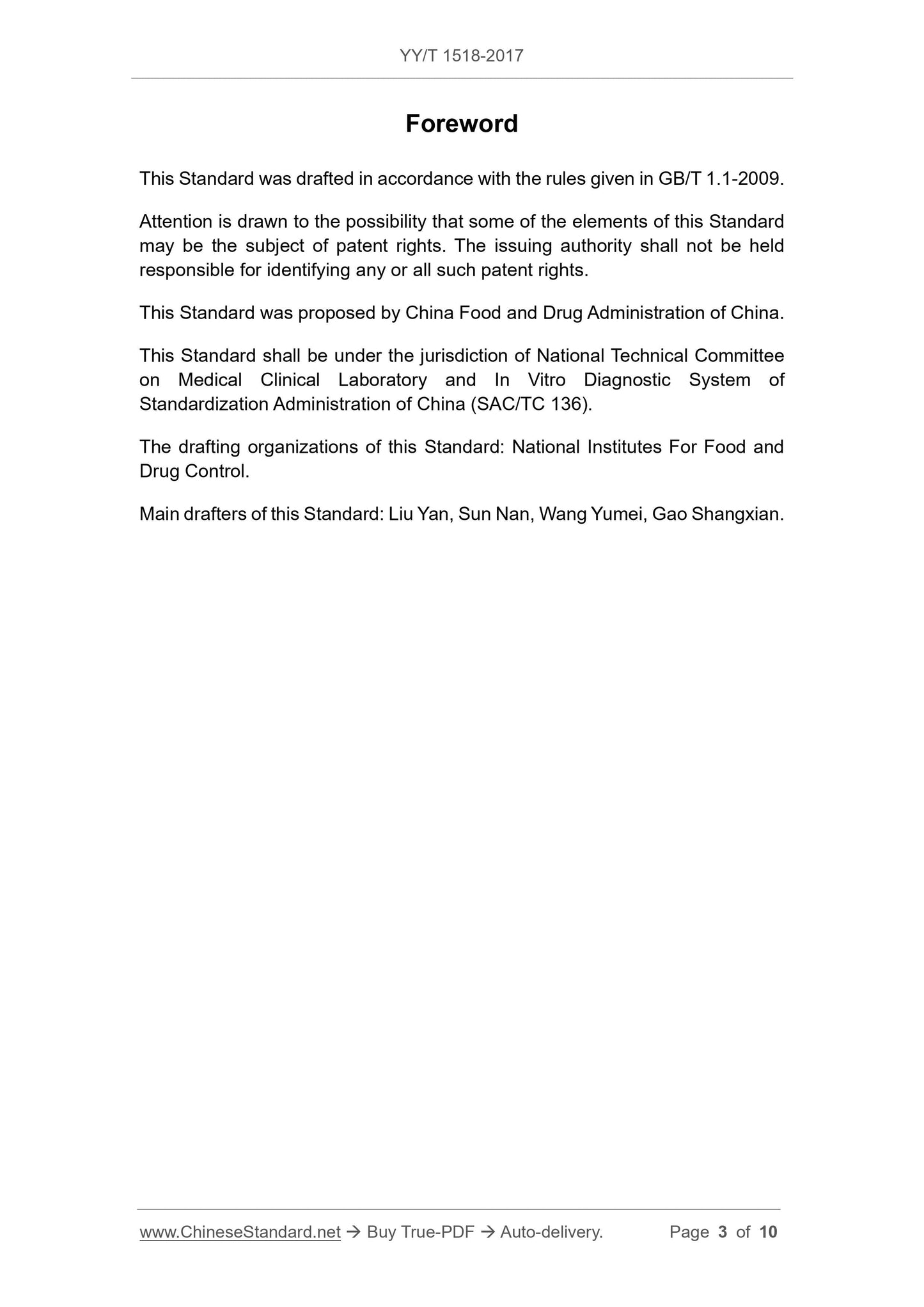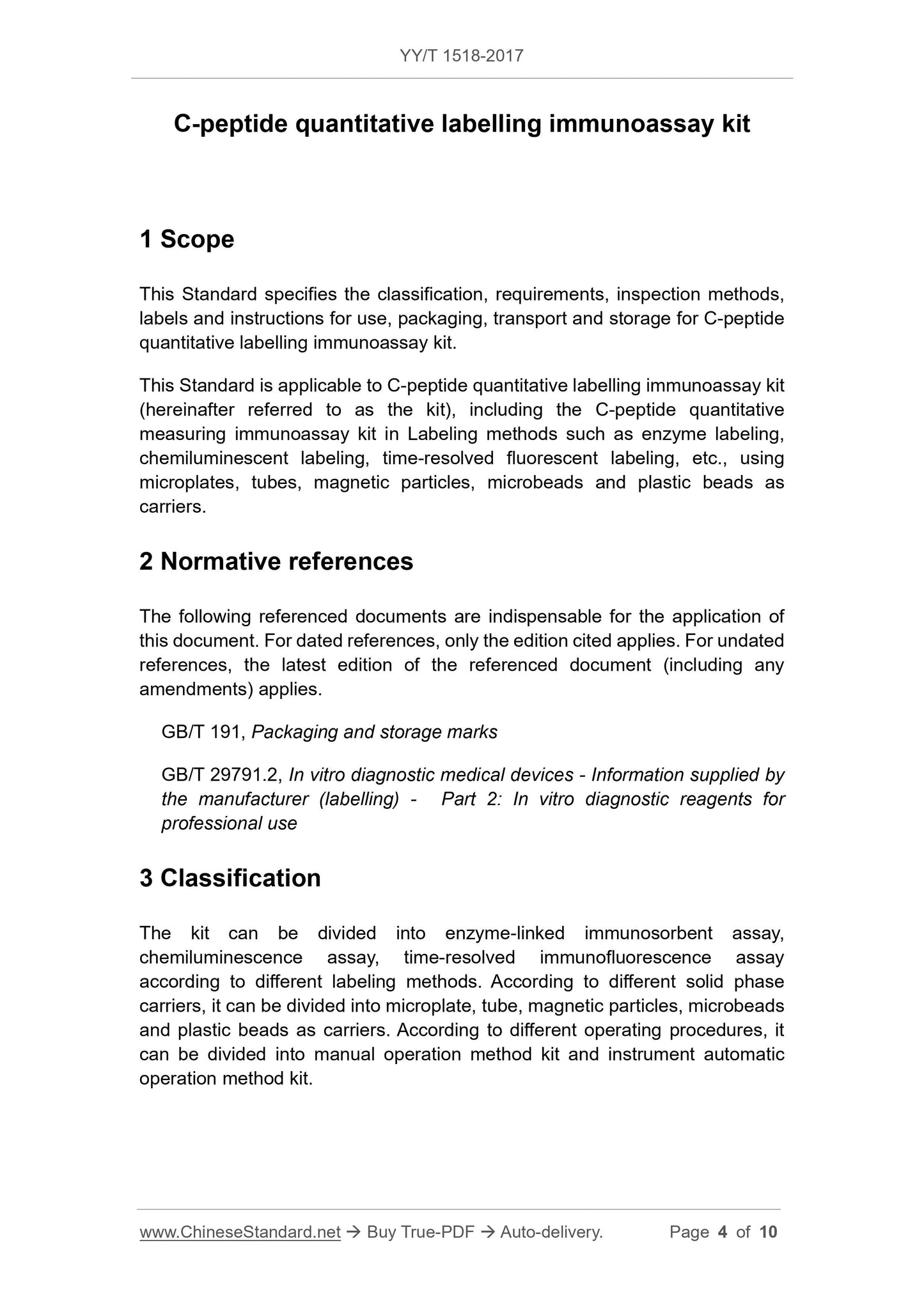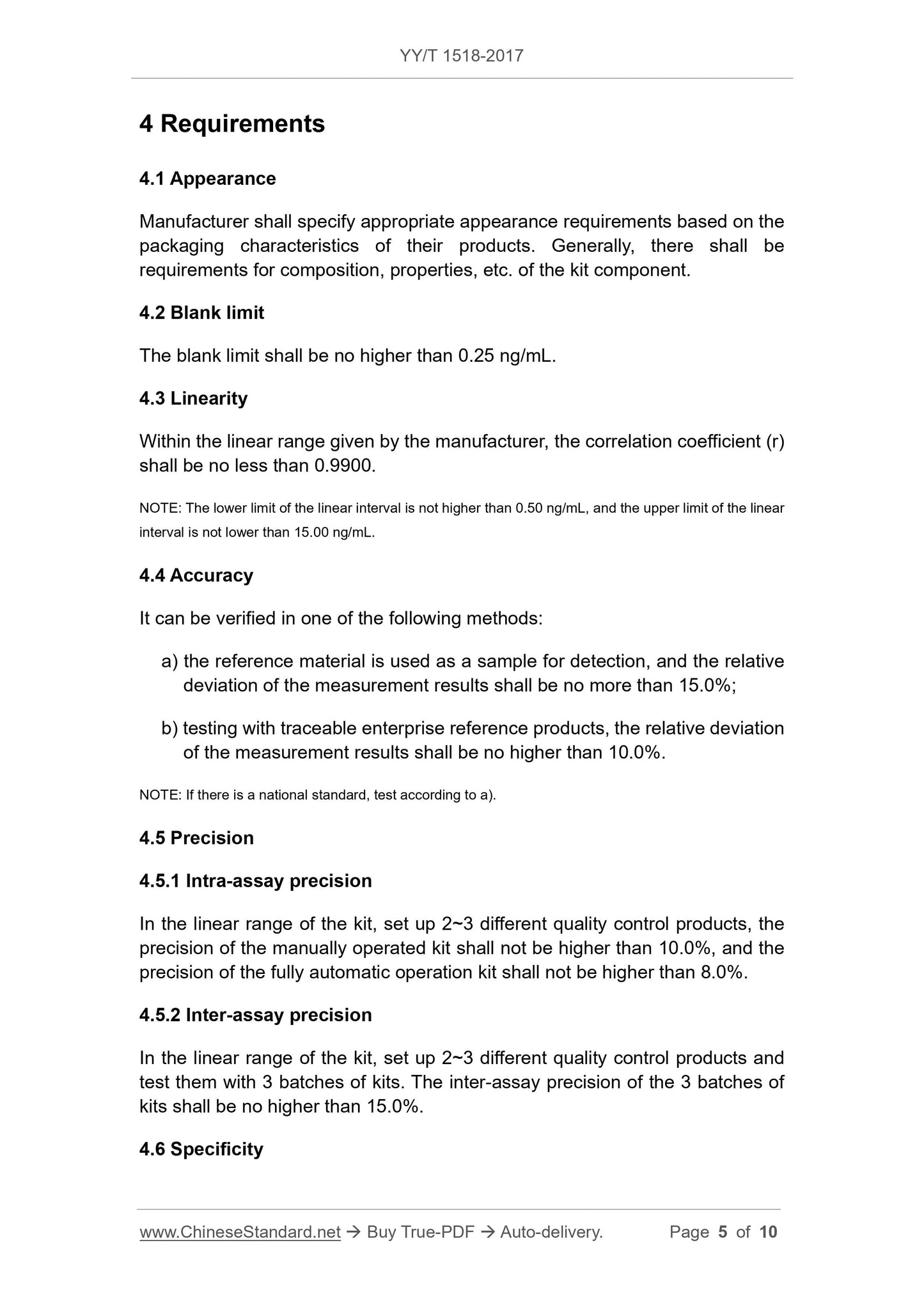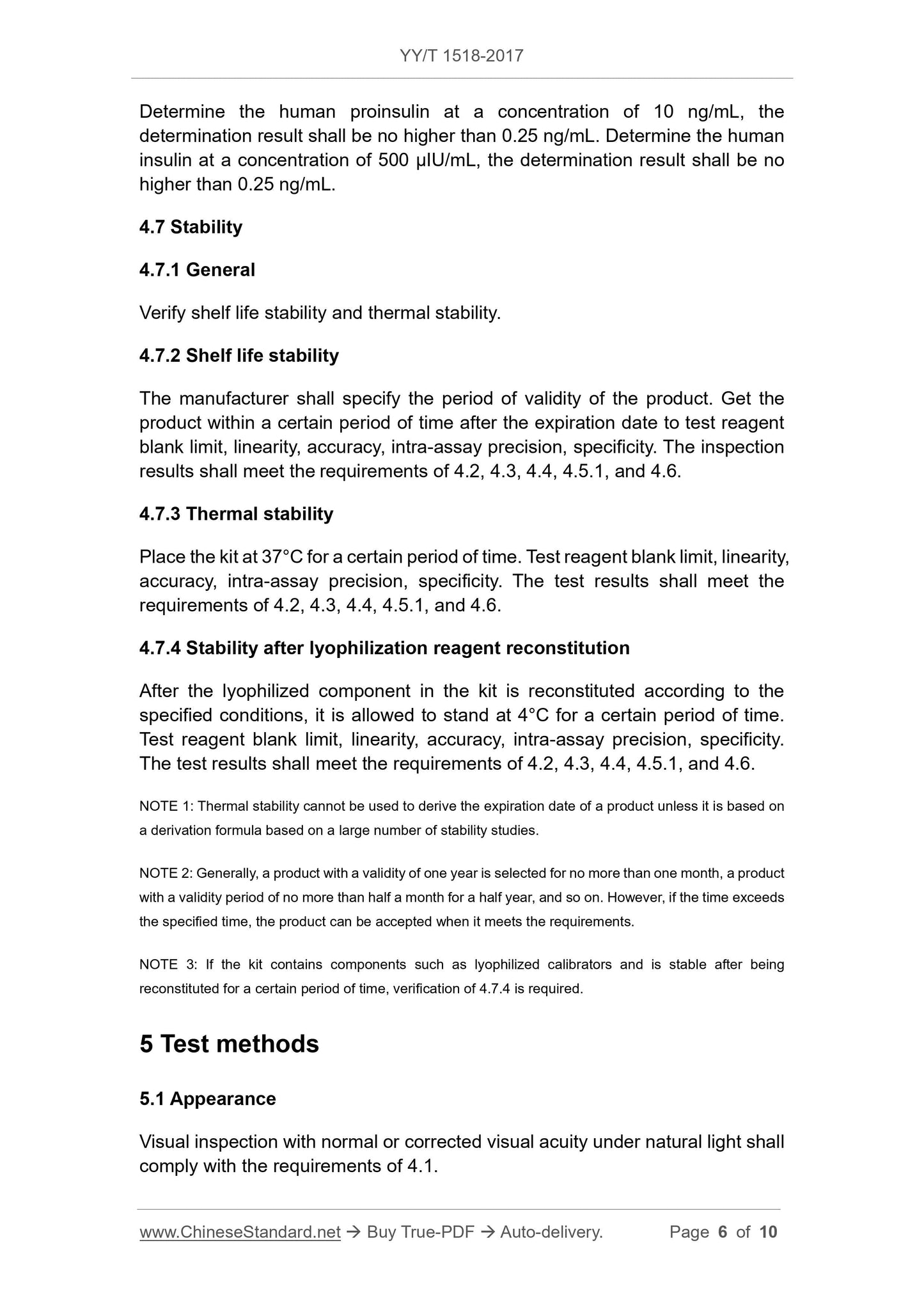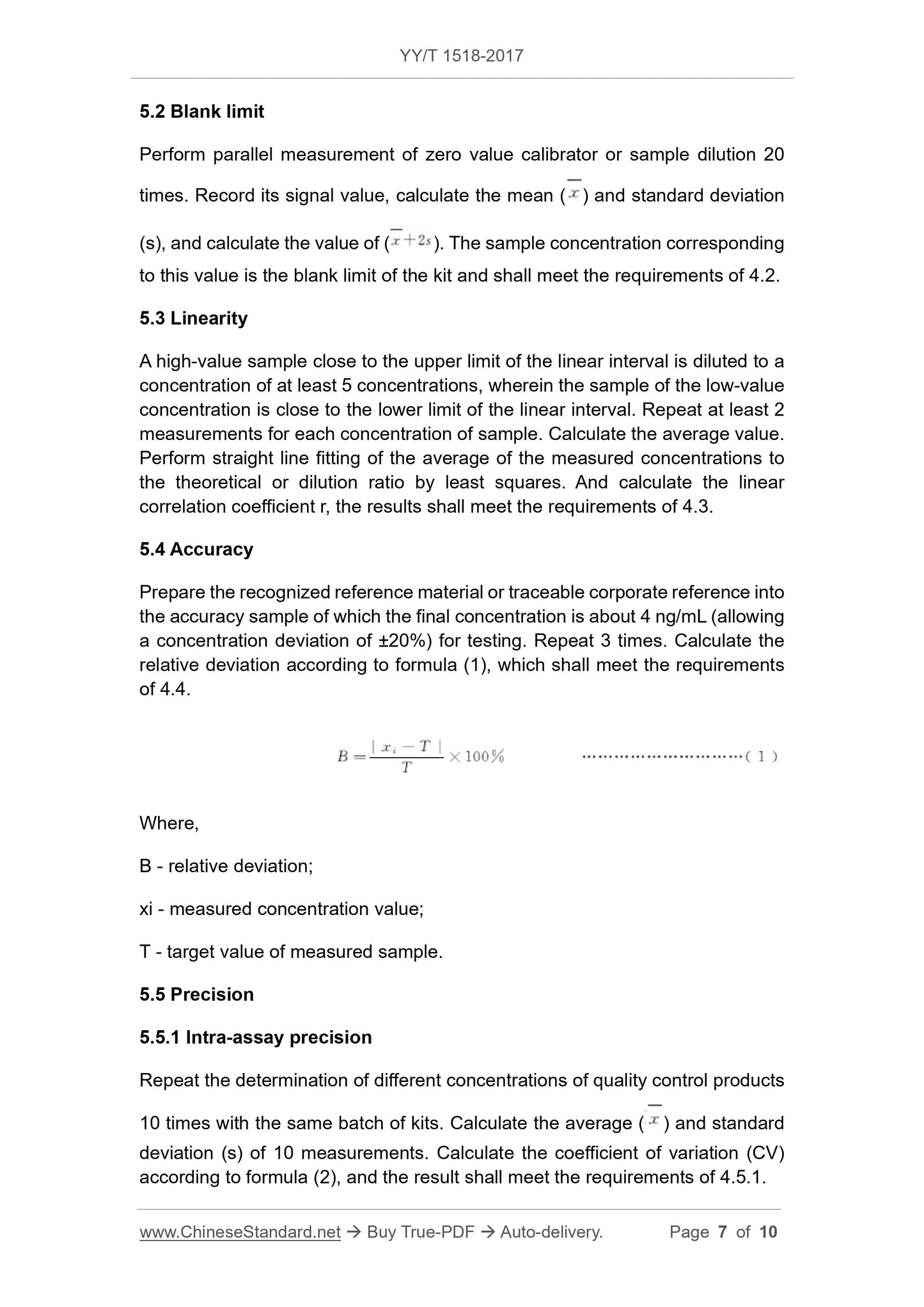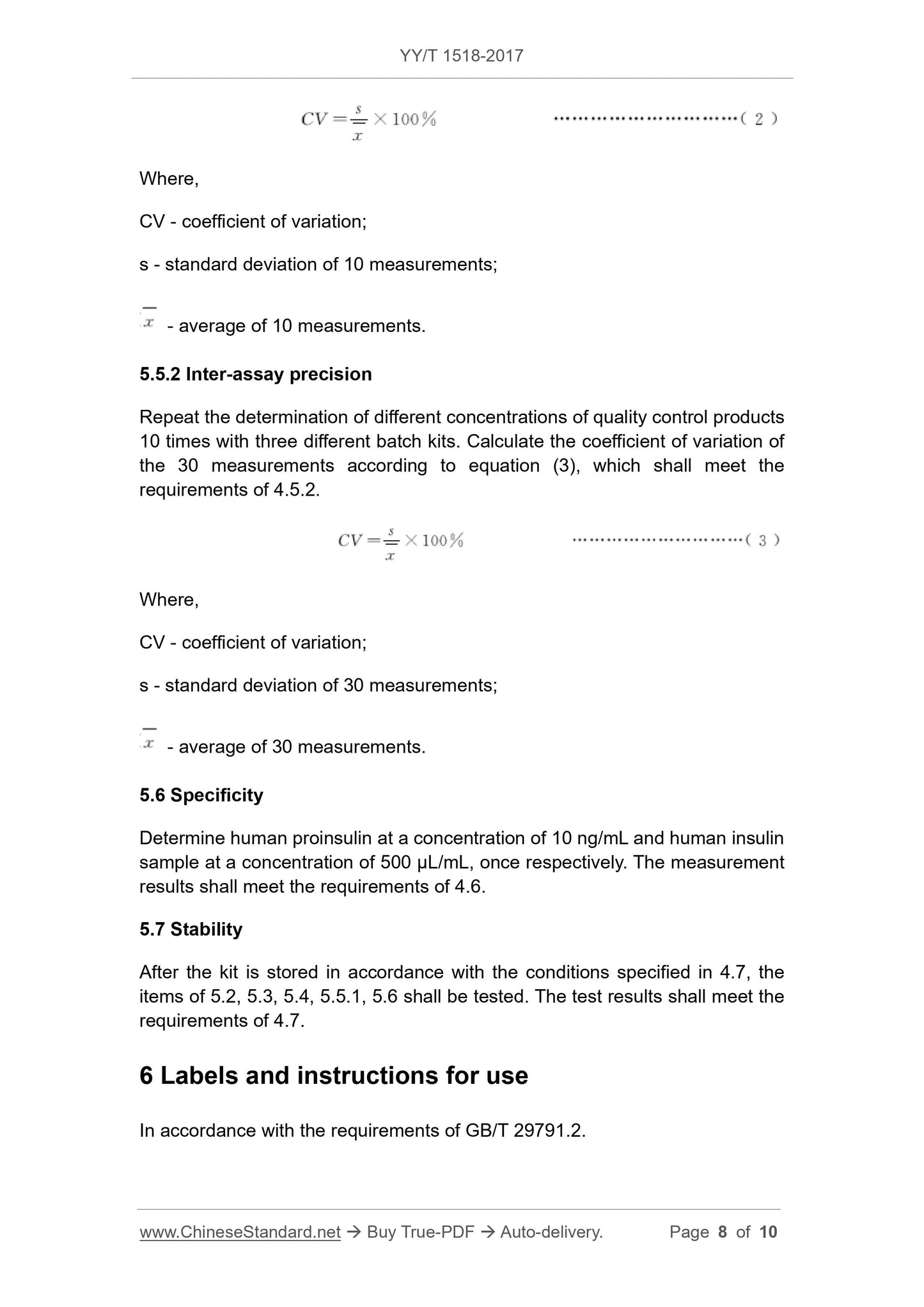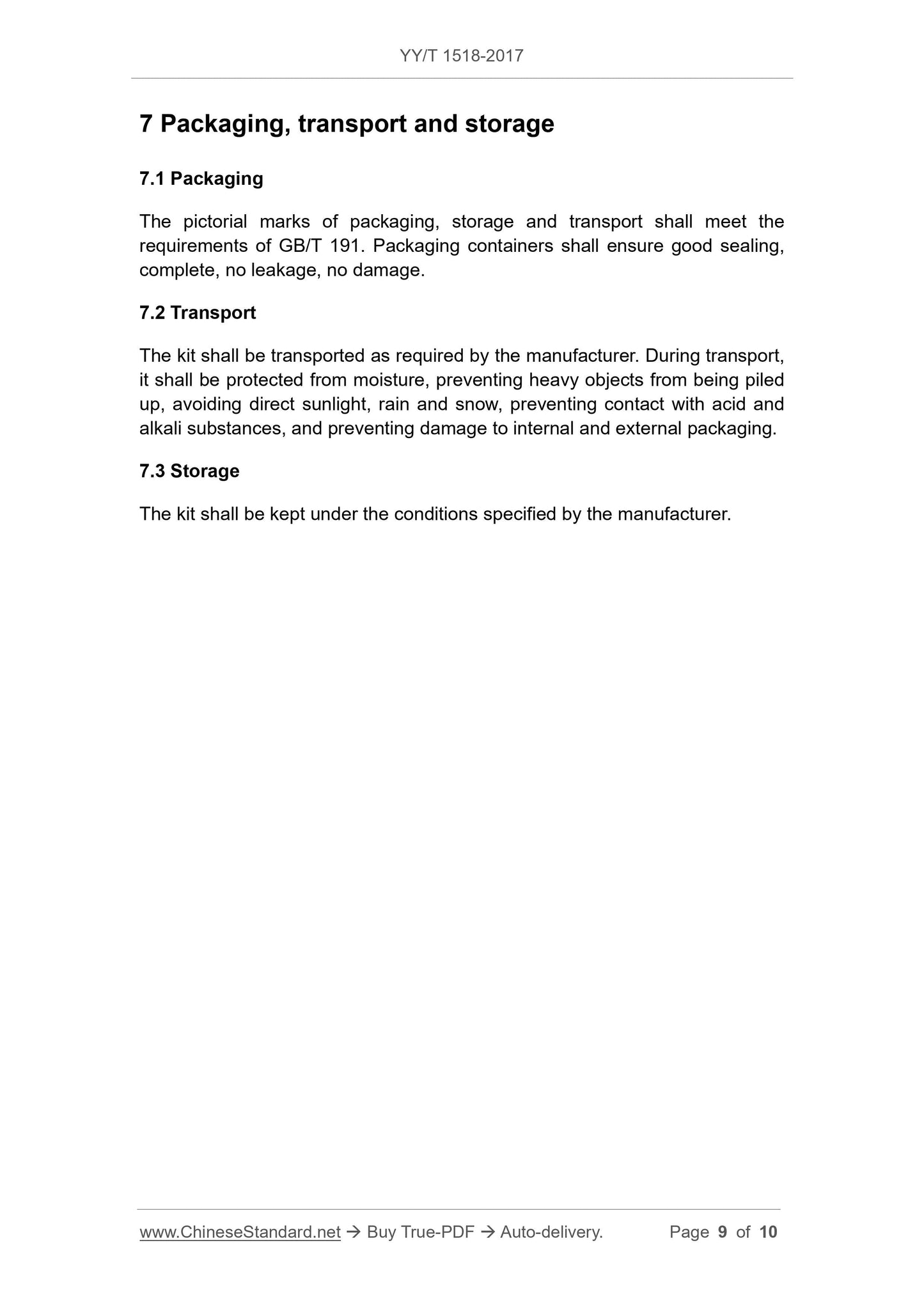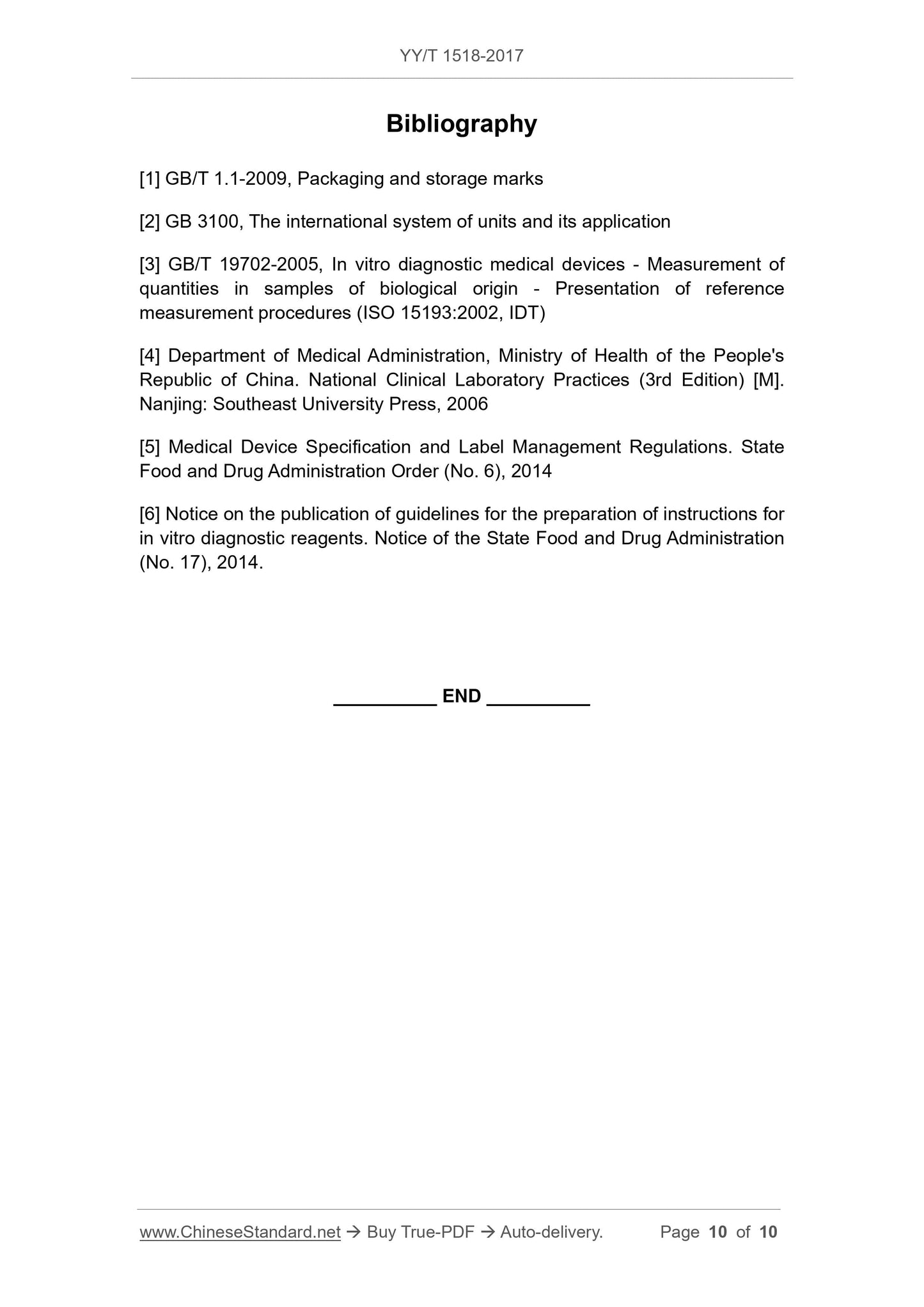1
/
of
10
PayPal, credit cards. Download editable-PDF & invoice in 1 second!
YY/T 1518-2017 English PDF (YYT1518-2017)
YY/T 1518-2017 English PDF (YYT1518-2017)
Regular price
$150.00 USD
Regular price
Sale price
$150.00 USD
Unit price
/
per
Shipping calculated at checkout.
Couldn't load pickup availability
Delivery: 3 seconds. Download true-PDF + Invoice.
Get QUOTATION in 1-minute: Click YY/T 1518-2017
Historical versions: YY/T 1518-2017
Preview True-PDF (Reload/Scroll if blank)
YY/T 1518-2017: C-peptide quantitative labelling immunoassay kit
YY/T 1518-2017
YY
PHARMACEUTICAL INDUSTRY STANDARD
OF THE PEOPLE’S REPUBLIC OF CHINA
ICS 11.100
C 44
C-peptide quantitative labelling immunoassay kit
ISSUED ON. MARCH 28, 2017
IMPLEMENTED ON. APRIL 1, 2018
Issued by. China Food and Drug Administration of China
Table of Contents
Foreword ... 3
1 Scope ... 4
2 Normative references ... 4
3 Classification ... 4
4 Requirements ... 5
5 Test methods ... 6
6 Labels and instructions for use ... 8
7 Packaging, transport and storage ... 9
Bibliography ... 10
C-peptide quantitative labelling immunoassay kit
1 Scope
This Standard specifies the classification, requirements, inspection methods,
labels and instructions for use, packaging, transport and storage for C-peptide
quantitative labelling immunoassay kit.
This Standard is applicable to C-peptide quantitative labelling immunoassay kit
(hereinafter referred to as the kit), including the C-peptide quantitative
measuring immunoassay kit in Labeling methods such as enzyme labeling,
chemiluminescent labeling, time-resolved fluorescent labeling, etc., using
microplates, tubes, magnetic particles, microbeads and plastic beads as
carriers.
2 Normative references
The following referenced documents are indispensable for the application of
this document. For dated references, only the edition cited applies. For undated
references, the latest edition of the referenced document (including any
amendments) applies.
GB/T 191, Packaging and storage marks
GB/T 29791.2, In vitro diagnostic medical devices - Information supplied by
the manufacturer (labelling) - Part 2. In vitro diagnostic reagents for
professional use
3 Classification
The kit can be divided into enzyme-linked immunosorbent assay,
chemiluminescence assay, time-resolved immunofluorescence assay
according to different labeling methods. According to different solid phase
carriers, it can be divided into microplate, tube, magnetic particles, microbeads
and plastic beads as carriers. According to different operating procedures, it
can be divided into manual operation method kit and instrument automatic
operation method kit.
Determine the human proinsulin at a concentration of 10 ng/mL, the
determination result shall be no higher than 0.25 ng/mL. Determine the human
insulin at a concentration of 500 μIU/mL, the determination result shall be no
higher than 0.25 ng/mL.
4.7 Stability
4.7.1 General
Verify shelf life stability and thermal stability.
4.7.2 Shelf life stability
The manufacturer shall specify the period of validity of the product. Get the
product within a certain period of time after the expiration date to test reagent
blank limit, linearity, accuracy, intra-assay precision, specificity. The inspection
results shall meet the requirements of 4.2, 4.3, 4.4, 4.5.1, and 4.6.
4.7.3 Thermal stability
Place the kit at 37°C for a certain period of time. Test reagent blank limit, linearity,
accuracy, intra-assay precision, specificity. The test results shall meet the
requirements of 4.2, 4.3, 4.4, 4.5.1, and 4.6.
4.7.4 Stability after lyophilization reagent reconstitution
After the lyophilized component in the kit is reconstituted according to the
specified conditions, it is allowed to stand at 4°C for a certain period of time.
Test reagent blank limit, linearity, accuracy, intra-assay precision, specificity.
The test results shall meet the requirements of 4.2, 4.3, 4.4, 4.5.1, and 4.6.
NOTE 1. Thermal stability cannot be used to derive the expiration date of a product unless it is based on
a derivation formula based on a large number of stability studies.
NOTE 2. Generally, a product with a validity of one year is selected for no more than one month, a product
with a validity period of no more than half a month for a half year, and so on. However, if the time exceeds
the specified time, the product can be accepted when it meets the requirements.
NOTE 3. If the kit contains components such as lyophilized calibrators and is stable after being
reconstituted for a certain period of time, verification of 4.7.4 is required.
5 Test methods
5.1 Appearance
Visual inspection with normal or corrected visual acuity under natural light shall
comply with the requirements of 4.1.
Where,
CV - coefficient of variation;
s - standard deviation of 10 measurements;
- average of 10 measurements.
5.5.2 Inter-assay precision
Repeat the determination of different concentrations of quality control products
10 times with three different batch kits. Calculate the coefficient of variation of
the 30 measurements according to equation (3), which shall meet the
requirements of 4.5.2.
Where,
CV - coefficient of variation;
s - standard deviation of 30 measurements;
- average of 30 measurements.
5.6 Specificity
Determine human proinsulin at a concentration of 10 ng/mL and human insulin
sample at a concentration of 500 μL/mL, once respectively. The measurement
results shall meet the requirements of 4.6.
5.7 Stability
After the kit is stored in accordance with the conditions specified in 4.7, the
items of 5.2, 5.3, 5.4, 5.5.1, 5.6 shall be tested. The test results shall meet the
requirements of 4.7.
6 Labels and instructions for use
In accordance with the requirements of GB/T 29791.2.
Get QUOTATION in 1-minute: Click YY/T 1518-2017
Historical versions: YY/T 1518-2017
Preview True-PDF (Reload/Scroll if blank)
YY/T 1518-2017: C-peptide quantitative labelling immunoassay kit
YY/T 1518-2017
YY
PHARMACEUTICAL INDUSTRY STANDARD
OF THE PEOPLE’S REPUBLIC OF CHINA
ICS 11.100
C 44
C-peptide quantitative labelling immunoassay kit
ISSUED ON. MARCH 28, 2017
IMPLEMENTED ON. APRIL 1, 2018
Issued by. China Food and Drug Administration of China
Table of Contents
Foreword ... 3
1 Scope ... 4
2 Normative references ... 4
3 Classification ... 4
4 Requirements ... 5
5 Test methods ... 6
6 Labels and instructions for use ... 8
7 Packaging, transport and storage ... 9
Bibliography ... 10
C-peptide quantitative labelling immunoassay kit
1 Scope
This Standard specifies the classification, requirements, inspection methods,
labels and instructions for use, packaging, transport and storage for C-peptide
quantitative labelling immunoassay kit.
This Standard is applicable to C-peptide quantitative labelling immunoassay kit
(hereinafter referred to as the kit), including the C-peptide quantitative
measuring immunoassay kit in Labeling methods such as enzyme labeling,
chemiluminescent labeling, time-resolved fluorescent labeling, etc., using
microplates, tubes, magnetic particles, microbeads and plastic beads as
carriers.
2 Normative references
The following referenced documents are indispensable for the application of
this document. For dated references, only the edition cited applies. For undated
references, the latest edition of the referenced document (including any
amendments) applies.
GB/T 191, Packaging and storage marks
GB/T 29791.2, In vitro diagnostic medical devices - Information supplied by
the manufacturer (labelling) - Part 2. In vitro diagnostic reagents for
professional use
3 Classification
The kit can be divided into enzyme-linked immunosorbent assay,
chemiluminescence assay, time-resolved immunofluorescence assay
according to different labeling methods. According to different solid phase
carriers, it can be divided into microplate, tube, magnetic particles, microbeads
and plastic beads as carriers. According to different operating procedures, it
can be divided into manual operation method kit and instrument automatic
operation method kit.
Determine the human proinsulin at a concentration of 10 ng/mL, the
determination result shall be no higher than 0.25 ng/mL. Determine the human
insulin at a concentration of 500 μIU/mL, the determination result shall be no
higher than 0.25 ng/mL.
4.7 Stability
4.7.1 General
Verify shelf life stability and thermal stability.
4.7.2 Shelf life stability
The manufacturer shall specify the period of validity of the product. Get the
product within a certain period of time after the expiration date to test reagent
blank limit, linearity, accuracy, intra-assay precision, specificity. The inspection
results shall meet the requirements of 4.2, 4.3, 4.4, 4.5.1, and 4.6.
4.7.3 Thermal stability
Place the kit at 37°C for a certain period of time. Test reagent blank limit, linearity,
accuracy, intra-assay precision, specificity. The test results shall meet the
requirements of 4.2, 4.3, 4.4, 4.5.1, and 4.6.
4.7.4 Stability after lyophilization reagent reconstitution
After the lyophilized component in the kit is reconstituted according to the
specified conditions, it is allowed to stand at 4°C for a certain period of time.
Test reagent blank limit, linearity, accuracy, intra-assay precision, specificity.
The test results shall meet the requirements of 4.2, 4.3, 4.4, 4.5.1, and 4.6.
NOTE 1. Thermal stability cannot be used to derive the expiration date of a product unless it is based on
a derivation formula based on a large number of stability studies.
NOTE 2. Generally, a product with a validity of one year is selected for no more than one month, a product
with a validity period of no more than half a month for a half year, and so on. However, if the time exceeds
the specified time, the product can be accepted when it meets the requirements.
NOTE 3. If the kit contains components such as lyophilized calibrators and is stable after being
reconstituted for a certain period of time, verification of 4.7.4 is required.
5 Test methods
5.1 Appearance
Visual inspection with normal or corrected visual acuity under natural light shall
comply with the requirements of 4.1.
Where,
CV - coefficient of variation;
s - standard deviation of 10 measurements;
- average of 10 measurements.
5.5.2 Inter-assay precision
Repeat the determination of different concentrations of quality control products
10 times with three different batch kits. Calculate the coefficient of variation of
the 30 measurements according to equation (3), which shall meet the
requirements of 4.5.2.
Where,
CV - coefficient of variation;
s - standard deviation of 30 measurements;
- average of 30 measurements.
5.6 Specificity
Determine human proinsulin at a concentration of 10 ng/mL and human insulin
sample at a concentration of 500 μL/mL, once respectively. The measurement
results shall meet the requirements of 4.6.
5.7 Stability
After the kit is stored in accordance with the conditions specified in 4.7, the
items of 5.2, 5.3, 5.4, 5.5.1, 5.6 shall be tested. The test results shall meet the
requirements of 4.7.
6 Labels and instructions for use
In accordance with the requirements of GB/T 29791.2.
Share
